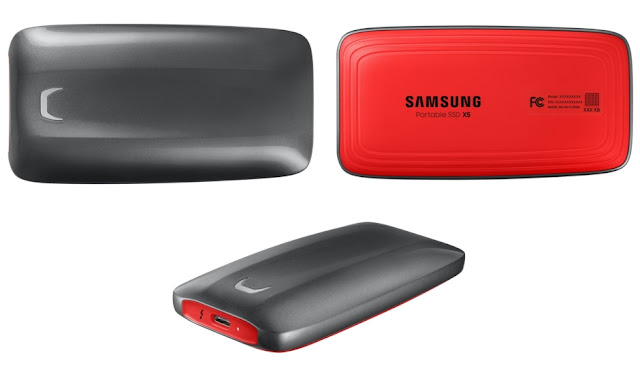Samsung has announced its first NVMe-based external solid state drive (SSD), the Portable SSD X5. The new SSD comes in 1TB, 2TB and 500GB variants and is aimed at users like video editors and content creators who need to move large files at faster speeds. Samsung claims that it can deliver read speeds of up to 2,800MB/s and write speeds of 2,300MB/s.
On the 500GB model, the write speed drops slightly down to 2,100 MB/s but owing to the Thunderbolt 3’s 40Gbps bandwidth, the X5 is said to enabling transferring a 20GB sized 4K UHD video in around 12 seconds. The device comes with a three-year limited warranty.
The SSD X5 is Thunderbolt 3 compatible but sadly is not backwards compatible and doesn’t work with USB. It enables hardware encryption using 256-bit AES protocol, including optional password protection and easily configurable security settings. The device features a full metal build with a glossy finish and comes with a non-slip bottom mat. It is said to withstand accidental drops of up to two meters and comes with Dynamic Thermal Guard technology and a heat sink to prevent overheating while transferring data.
The Portable SSD X5 will start shipping from September 3 and will cost $399.99 (Rs 28,208 approx) for the 500-gigabyte model, while its 1TB variant will cost $699.99 (Rs 49,400).
Its 2TB model has been priced at $1,399.99 (Rs 98,700 approx).
It will take some time before the X5 hits Indian shores but we recently reviewed the WD My Passport SSD. In our review, we said, “The WD My Passport SSD is an incredibly compact and pocketable little thing that brings a sense of comfort to a standard that has so far, seen reluctant adoption. USB Type-C is the future, so it is about time we start moving towards it.
The WD MY Passport SSD is a good, but an expensive step in that direction. The 256GB drive costs roughly Rs 9000 on Amazon India, a price for which you could probably get a regular external drive with higher storage capacity. However, here you’re paying for the speed and robustness and not necessarily the storage capacity. If you’re wondering why choose this drive over a pen-drive with the same exact features and capacity, well, let me ask you this; how many pen-drives have you actually managed to not lose in the last year?“
On the 500GB model, the write speed drops slightly down to 2,100 MB/s but owing to the Thunderbolt 3’s 40Gbps bandwidth, the X5 is said to enabling transferring a 20GB sized 4K UHD video in around 12 seconds. The device comes with a three-year limited warranty.
The SSD X5 is Thunderbolt 3 compatible but sadly is not backwards compatible and doesn’t work with USB. It enables hardware encryption using 256-bit AES protocol, including optional password protection and easily configurable security settings. The device features a full metal build with a glossy finish and comes with a non-slip bottom mat. It is said to withstand accidental drops of up to two meters and comes with Dynamic Thermal Guard technology and a heat sink to prevent overheating while transferring data.
The Portable SSD X5 will start shipping from September 3 and will cost $399.99 (Rs 28,208 approx) for the 500-gigabyte model, while its 1TB variant will cost $699.99 (Rs 49,400).
Its 2TB model has been priced at $1,399.99 (Rs 98,700 approx).
It will take some time before the X5 hits Indian shores but we recently reviewed the WD My Passport SSD. In our review, we said, “The WD My Passport SSD is an incredibly compact and pocketable little thing that brings a sense of comfort to a standard that has so far, seen reluctant adoption. USB Type-C is the future, so it is about time we start moving towards it.
The WD MY Passport SSD is a good, but an expensive step in that direction. The 256GB drive costs roughly Rs 9000 on Amazon India, a price for which you could probably get a regular external drive with higher storage capacity. However, here you’re paying for the speed and robustness and not necessarily the storage capacity. If you’re wondering why choose this drive over a pen-drive with the same exact features and capacity, well, let me ask you this; how many pen-drives have you actually managed to not lose in the last year?“










